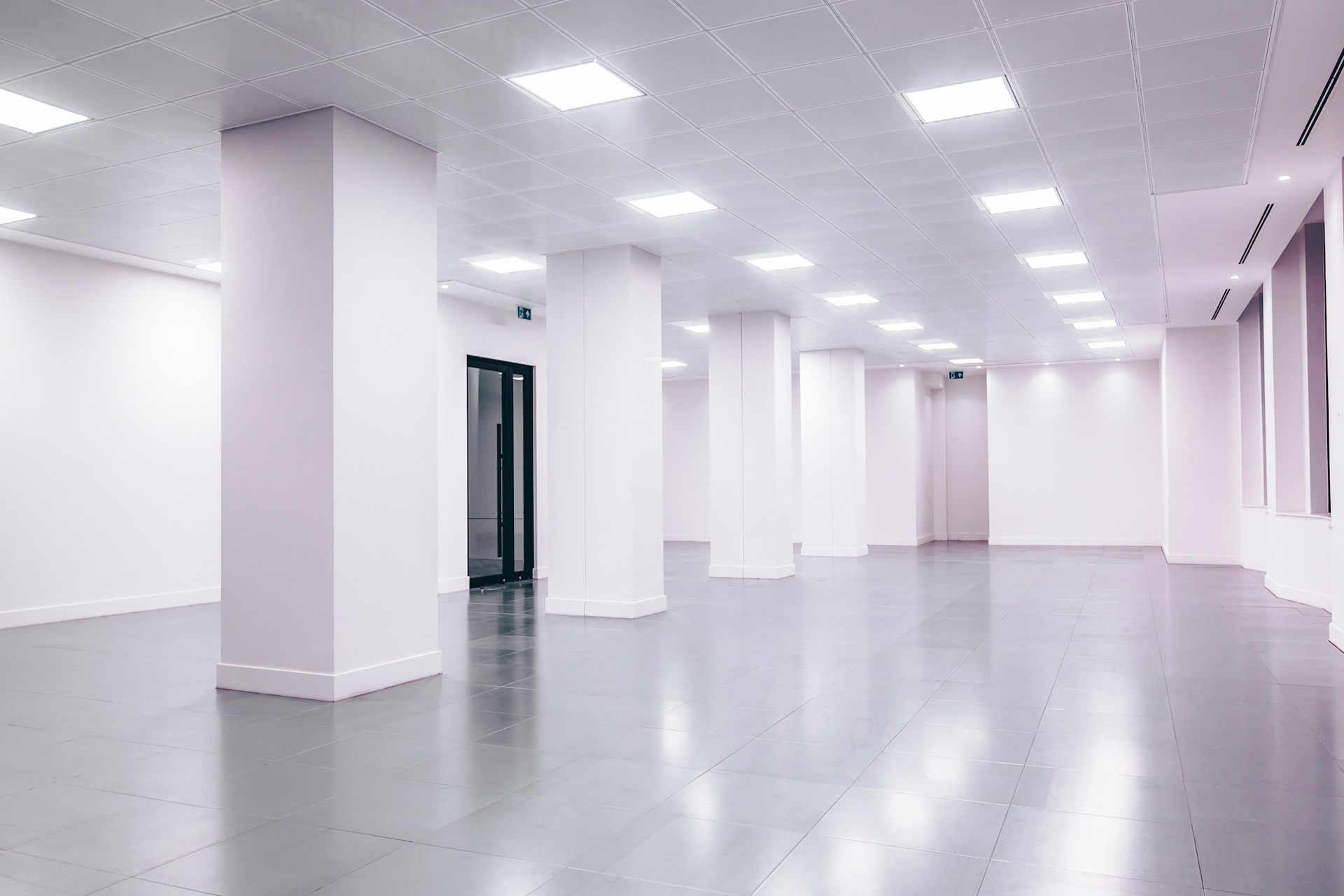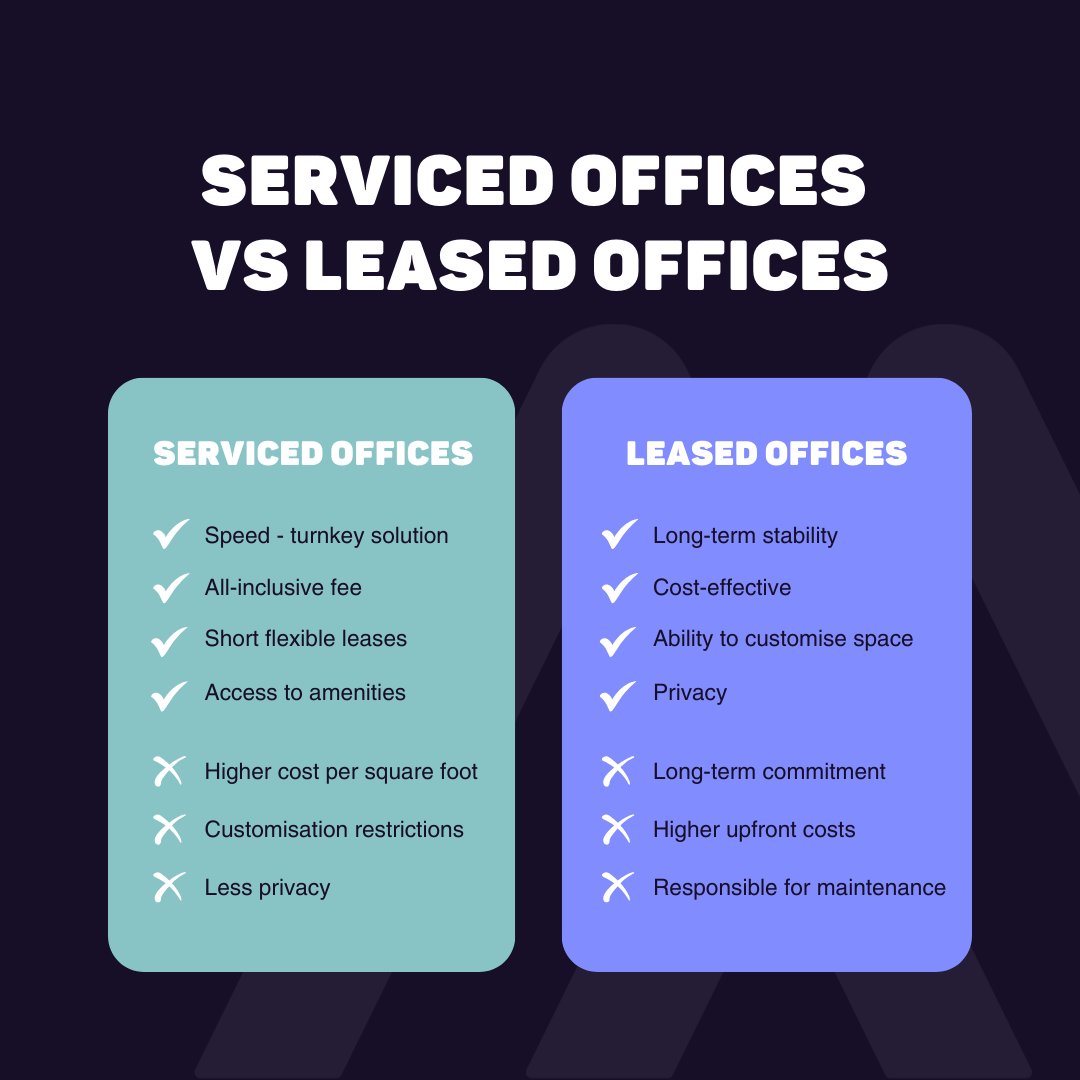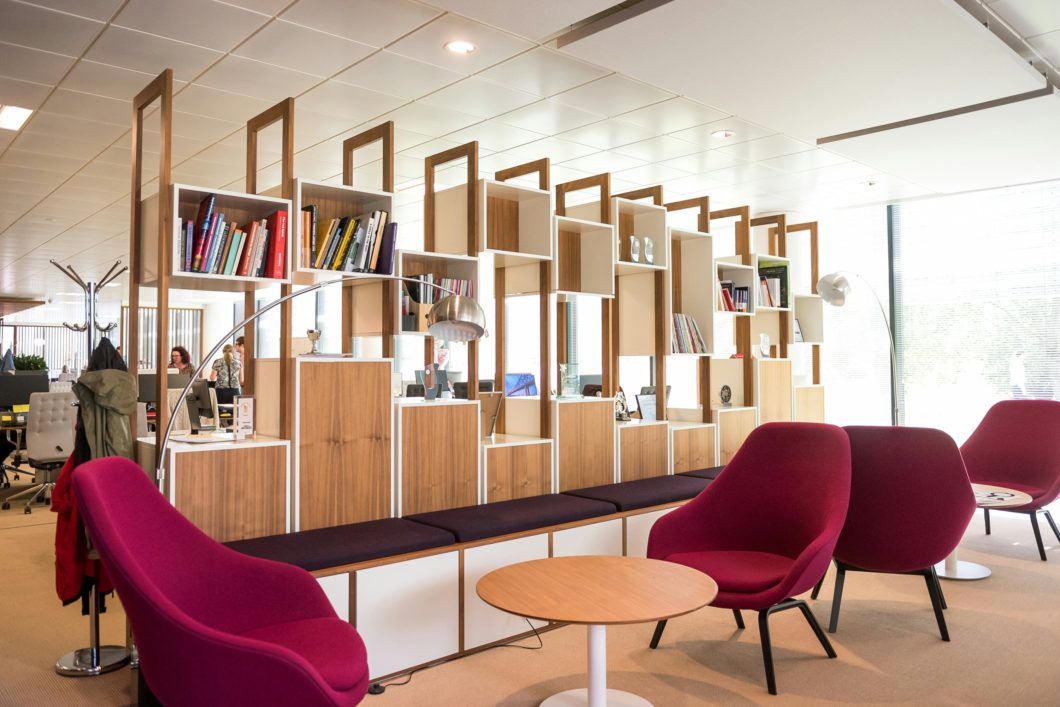Weigh up the pros and cons of serviced and leased office spaces and determine the best fit for your business, with this comprehensive guide by our experts here at Making Moves.
By Making Moves London
July 1, 2024
Having helped hundreds of businesses in their search for a new office space, one of the most common questions we are asked is, ‘What’s the difference between serviced offices and leased offices, and which one is right for my business?’. It’s an important question, and one that highlights the importance of choosing the right office space – a decision that can go on to impact your company’s operations, culture and finances.

That’s why our relocation experts here at Making Moves have put together this comprehensive guide, offering a detailed comparison between serviced and leased offices, along with the advantages and drawbacks of each. So, keep reading to fully understand your options and gain the confidence that you’re making the right choice for your business.
Simply put, serviced offices are fully furnished office spaces maintained and managed by third-party office providers.
Serviced offices epitomise convenience and flexibility in the modern workspace landscape. They are ready-to-use office spaces equipped with essential amenities, offering a ‘turnkey solution’ for businesses. Unlike traditional leased offices, serviced offices come fully furnished and inclusive of services such as utilities, internet connectivity, and maintenance.
Serviced office spaces typically have an all-inclusive fee and can come with a range of additional amenities such as barista-style coffee, shared meeting spaces and, in some cases, onsite gyms. Unlike traditional office leases, serviced offices often offer shorter lease terms, providing businesses with added flexibility.
This plug-and-play approach allows businesses to move swiftly and focus on their core operations without the hassle of setting up infrastructure.
Serviced offices cater to a wide variety of businesses, ranging from startups and freelancers to established corporations.
Startups, in particular, find serviced offices appealing as they provide a reputable business address without the financial commitment of a long-term lease. Additionally, fast-growing companies appreciate the flexibility offered by serviced offices, allowing them to scale up or downsize according to their evolving needs.
Moreover, businesses entering new markets can benefit from the agility and convenience of serviced offices, enabling them to establish a presence swiftly and efficiently.
The pros:
The cons:

Let’s dive into the array of amenities offered by serviced office spaces. While the specifics may vary depending on the management company, typical offerings include essential office furnishings, telecommunications infrastructure, phone and internet services, and printing and IT facilities such as scanning and copying. Additionally, in multi-tenant buildings, tenants can often access shared meeting rooms, which can foster collaboration and productivity among businesses sharing the space.
Many serviced offices go the extra mile by providing onsite assistance through staffed reception or management teams. This helps to ensure seamless operations and addresses any day-to-day issues promptly. Some establishments even offer concierge services or virtual assistants to streamline administrative tasks.
To enhance the work experience, refreshments like tea, coffee, and snacks are commonly available within serviced offices. For those seeking a touch of luxury, premium spaces may boast additional amenities such as onsite gyms and parking bays – which we all know can be hard to come by in Central London. While the allure of barista-style coffee and deluxe perks is undeniable, it’s essential to prioritise the specific needs and preferences of your business above all else.
London offers many options for businesses seeking serviced office spaces, with various boroughs catering to different industries and preferences. In recent years, demand for serviced offices has surged, fueled by shifts in workspace preferences accelerated by the pandemic. As a result, new serviced office spaces are springing up across the city to meet this growing demand.
When choosing a location, it’s crucial to consider factors such as proximity to clients, transportation links, and the local business ecosystem. Additionally, budgetary constraints may influence your decision, as some areas command higher rents than others (Mayfair…we’re looking at you). Whether you’re drawn to the vibrant tech scene in Shoreditch or the corporate hub of Canary Wharf, selecting a location that aligns with your industry and company culture is essential.
If you already have a location in mind, explore our existing listings for available serviced office spaces. Alternatively, for personalised assistance in narrowing down your search, don’t hesitate to get in touch with one of our experienced relocation consultants today!

Now that you’re all clued up on the ins and outs of serviced offices, let’s take a look at leased office spaces. Leased offices represent the traditional approach to securing office space, where businesses enter into long-term rental agreements directly with landlords. Unlike serviced offices, leased offices are typically unfurnished spaces that tenants are responsible for doing up according to their needs and preferences.
Lease terms for traditional offices tend to be longer, typically three to ten years or more, providing stability but limiting flexibility for businesses. While leased offices offer greater autonomy and customisation options than serviced offices, they also require tenants to manage various aspects such as utilities, maintenance, and internet connectivity separately – which can cost the business time and money.
However, leased offices may offer cost advantages over serviced offices in the long run, particularly for larger spaces or businesses with specific design requirements. Ultimately, the decision between leased and serviced offices hinges on factors such as budget, space requirements, and long-term business goals.
The stability of leased offices appeals to a broad spectrum of businesses, from small and medium enterprises (SMEs) to the blue chips of the business world.
For startups or entrepreneurs, having a fixed price that includes access to the building’s amenities as well as utilities such as electricity and internet could be particularly useful – helping them focus on their core business and plan for the future. With the ability to tailor the space to their specific requirements, leased offices allow smaller businesses to create a professional environment conducive to growth and productivity.
Similarly, established corporations value the stability and control of leased offices, allowing them to establish a permanent presence and reinforce their brand identity. Moreover, leased offices provide a solid foundation for businesses seeking to expand into new markets, offering the stability and security necessary to navigate unfamiliar territories effectively.
The pros:
The cons:

Leased office spaces typically have the fundamental infrastructure necessary for daily operations, such as utilities, heating, ventilation, air conditioning (HVAC), and routine building maintenance. These essential services ensure a functional and comfortable workspace for tenants. However, beyond these basic provisions, leased office spaces often require tenants to furnish and equip the space according to their specific needs and preferences.
While some landlords may offer furnished or semi-furnished options, tenants usually have the flexibility to customise the layout and design of the workspace to align with their branding and operational requirements. This may involve installing office furniture, setting up telecommunications infrastructure, such as phone lines and internet connectivity, and arranging access to shared meeting spaces or conference rooms – all of which can cost time and money for the business.
Moreover, tenants may need to coordinate additional amenities independently, such as IT support services, printing and copying facilities, and access to amenities like parking facilities or onsite cafeterias. The extent of amenities included in a leased office space varies depending on the lease agreement and tenant’s specific requirements, highlighting the importance of thorough negotiation and clarification of terms before finalising the lease agreement.
As one of the leading business hubs in the world, leased office spaces in London are not hard to come by. Office spaces of all shapes and sizes are available to lease in every corner of the city.
The challenging part is deciding which location suits your particular business. This can depend on the industry in which you operate within, the proximity of your clients and employees, and of course, your budget. For example, tech startups often thrive in the innovative hub of Shoreditch, while established finance firms gravitate towards Canary Wharf. However, those seeking more budget-friendly options may find neighbouring boroughs like Stratford appealing.
Our relocation consultants possess in-depth knowledge of London’s diverse boroughs and can provide expert guidance in selecting the ideal location for your business. For tailored advice, get in touch today. Alternatively, check out our guide to the best locations to grow a business in London for more local insights.

Managed offices, much like serviced offices, are designed to provide businesses with convenience and flexibility. However, they differ in several key ways that might make them a more suitable option for certain companies. Managed offices are essentially a middle ground between serviced and leased offices, offering a blend of the flexibility and amenities found in serviced offices with the autonomy and customisation potential of leased spaces.
Managed offices are typically leased out by property management companies that take over the responsibility of outfitting and maintaining the space according to the tenant’s specifications. This means businesses can enjoy a customised office environment without the hassle of managing the setup and ongoing maintenance themselves.
These spaces often come with pre-agreed terms that include essential services such as cleaning, maintenance, and sometimes IT support, allowing businesses to focus on their core activities. The lease terms for managed offices are usually more flexible than traditional leases, often ranging from one to three years, providing a balance between long-term stability and the adaptability needed in a dynamic business environment.
Managed offices cater to businesses seeking a balance between control and convenience. They are ideal for mid-sized companies that require a degree of customisation without the long-term commitment and high upfront costs associated with traditional leased offices.
Growing businesses, in particular, can benefit from managed offices as they provide the opportunity to scale up or downsize as needed without incurring significant costs. These offices are also suitable for companies looking to establish a presence in a new market, offering a professional and customisable space that can be tailored to fit specific operational needs quickly.
Additionally, businesses undergoing transitions, such as mergers or relocations, may find managed offices advantageous. They offer a stable base with flexible terms, enabling companies to adapt their workspace to changing circumstances without being locked into a long-term lease.
The pros:
The cons:

Managed offices typically include a range of amenities that facilitate smooth business operations. These often encompass basic furnishings, high-speed internet, and telecommunication infrastructure. Routine services like cleaning, maintenance, and security are also generally covered under the lease agreement.
In addition to these essentials, many managed offices provide access to shared meeting rooms, conference facilities, and break areas. Some may offer additional perks such as on-site IT support, reception services, and access to communal areas designed to foster collaboration and networking among tenants.
The specifics can vary widely depending on the management company and the agreed terms, so it’s crucial for businesses to clearly understand what is included in their managed office package to avoid unexpected costs.
Managed office spaces are plentiful across London, catering to a wide range of industries and business needs. The question is not so much about availability but rather about which area will best support your business’s growth and operational goals.
Shoreditch and Clerkenwell, for example, are ideal for tech companies and creative industries, known for their vibrant atmospheres and innovative business communities. Whereas, Victoria and Westminster are popular amongst businesses in finance and professional services, providing prestigious addresses and close proximity to government institutions and corporate headquarters.
Our experienced relocation consultants at Making Moves can provide tailored advice and expert guidance to help you select the best managed office location for your business.
Now that we’ve covered the differences between serviced and leased offices and the pros and cons of each, you should feel more informed about choosing the right type of office space for your business. This decision is pivotal, directly impacting your daily operations, company culture, and financial outlook.
Ultimately, the decision between serviced and leased office spaces hinges on various factors such as budget, space requirements, flexibility needs, and long-term business goals. Take the time to reflect on what matters most to your business.
Remember, you don’t have to navigate this decision alone. Our relocation consultants are here to assist you every step of the way. They can help you assess how each option would impact your business and guide you towards an informed decision that aligns with your unique needs and objectives.
Whether you opt for the convenience of a serviced office or the autonomy of a leased space, Making Moves is here to support you every step of the way.
Our experienced relocation consultants are ready to provide expert guidance and personalised assistance in finding the perfect office space for your business needs. Contact us today to learn more about our services and start your journey towards securing your ideal workspace in London.

🚚 Source, negotiate and manage entire office moves.
🏢 Dispose, sublet or redesign your office.
🖊️ Professional, independent support.